RIGHT TURN ONLY!!
Detroit Gravitation City
by Carlo Santos,

I'm going to go with the rest of the sports media and say Lakers in 6.
(Much has been made of the Kobe-era Lakers being a bunch of arrogant slackers who don't put in full effort until the playoffs. This year, they didn't show up until the 4th quarter of Game 5 of the Conference Finals. Goodness gracious, guys.)
20TH CENTURY BOYS
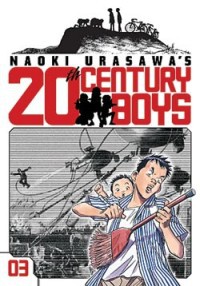
Vol. 3
(by Naoki Urasawa, Viz Media, $12.99)
FROM THE BACK COVER:
"It turns out that the Friend's plan to destroy the world was dreamed up long ago by a group of boys playing 'good guys against bad guys' ... And now, the only one who can stop this diabolical plot from succeeding is the one who came up with it—Kenji!
Kenji races home and picks up the newspaper: sure enough, the mystery microbe has hit London. He thinks back over everything that has happened and what he and his childhood friends dug up, and is forced to face the unbelievable truth—someone really is putting into motion the story Kenji made up as a child, and people are dying because of it!"
EVIDENCE FOR:
Well, this is no surprise: Naoki Urasawa is amazing once he stops futzing around and gets to the point of this series. Now that the basic foundation of the story is made clear—and what a shockingly brilliant foundation it is, the idea that the good guy is responsible for all the bad guy's moves because he made it up in the first place—all that's left is for everything to spring into action. Naturally, the results are no less than breathtaking: from Kenji's stress-relieving guitar rockout, to the freakish mob behavior at the "Friend Concert," to the crisis at the airport, to the utterly chilling escape from the convenience store, everything moves at an irresistible pace. Urasawa's natural flair for the cinematic is a key factor in all this—no other artist is so adept at freezing a moment in time, or giving a scene an accelerated sense of motion, or even jumping in and out of flashbacks at just the right split second. The many characters wear many emotions on their faces, but there is clearly one overriding feeling right now: the excitement and suspense of finding out what happens next.
EVIDENCE AGAINST:
Urasawa loves to leave his readers hanging, which at times makes for heart-pounding storytelling, and at other times becomes a really annoying habit. For the "really annoying" part, just check out the class reunion chapter in this volume, where one of Kenji's old buddies reveals another possible suspect for "Friend," except that it takes him 20-plus pages to do it because he gets interrupted by other plot-expository details. When the fellow's name is finally revealed, he still remains as mysterious as that other suspect who disappeared years ago—because it's just soooo much fun to open up new plot threads and then forget to close them. Even the rip-roaring action scenes stumble from time to time when Kenji's friends have to stop and explain to each other what's going on. As a thriller, it's finally starting to pick up the pace—but it's still only as good as the author's ability to keep track of everything.
FINAL VERDICT:
When does the series start getting good? Right about now, it seems like. An action-packed A- effort that advances the story while also entertaining the reader.
CLOVER

(by CLAMP, Dark Horse, $19.95)
FROM THE BACK COVER:
"Kazuhiko is a young, but already deeply wounded, black-ops agent of a baroque, retro-tech world—pulled out of retirement to escort Sue, a mysterious waif, to a destination she alone knows. Sue and Kazuhiko have never met ... yet she knows him, having grown up since the age of four with her only human contact being two distant voices: that of her elderly "grandma"—Kazuhiko's commander, General Ko; and that of Kazuhiko's dead girlfriend, the beautiful singer Ora.
And Sue has been kept in that cage all these years because of what she is, and what the Clover Leaf Project found her to be: a military top secret ... and the most dangerous person in the world."
EVIDENCE FOR:
To paraphrase Stravinsky on Beethoven: "Clover is a contemporary manga that will be contemporary forever." This relic of the 90's, at once classic as well as modern, resonates with timeless themes: love, friendship, longing, and the emotional struggles of searching for happiness. The story is all but told in the first two volumes, but it is the third and penultimate volume—a backstory-filling prequel—that truly reveals the series' greatness. It is in this segment that the relationships between the main characters are made complete, where emotions swoop between warmth and tragedy. But even more than the story itself, it is CLAMP's daring artistic approach that makes Clover so forward-looking: the sparse sense of layout, the black-and-white baroqueness (later to be perfected in xxxHOLiC), the juxtaposition of words and pictures such that time seems to stand still—creating the image of an emotional state rather than any particular action or line of dialogue. Speaking of which, even the text is impressionistic, often relying on repeated song lyrics to emphasize a particular feeling. Many comics strive to achieve a cinematic quality; this one achieves pure poetry.
EVIDENCE AGAINST:
Song lyrics? Are you kidding me? Of all the hackneyed devices, they had to go with the most irritating one as a primary driving force in the story. With the mawkish, repetitive delivery of these lines, it seems more like self-indulgent emoting than genuine artistic expression. And that carries right over into the actual feelings of the characters, who express themselves in broad, clumsy strokes rather than with nuance—oh, she's deeply in love! He's deeply sad! This is deeply annoying! There's also simple-minded laziness to be found in the artwork, where backgrounds are generally an afterthought (unless CLAMP decides it's one of those times to impress us with post-apocalyptic ruins), and the lack of time and place makes the action-oriented first half feel coldly distant. Finally, it's the dumb little things—like a dark military conspiracy, wizards and psychics, a secret organization of bad dudes, and a side-character story involving twins—that ultimately knock Clover off its perch of greatness and prove it to be merely a pretentious pack of clichés.
FINAL VERDICT:
Even pretentiousness cannot stop the passion contained in this work. Pulling off emotion (and coherence!) in this challenging style deserves at least a B.
DETROIT METAL CITY
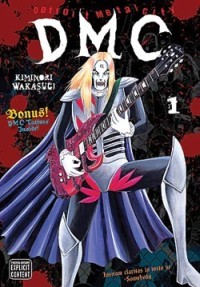
Vol. 1
(by Kiminori Wakasugi, Viz Media, $12.99)
FROM THE BACK COVER:
"By all appearances, Soichi Negishi is a sweet, well-mannered boy who loves Swedish pop muisc, trendy boutiques, and all things fashionable. But at the same time he's also Krauser II, front man for Detroit Metal City, an indie death metal band whose popularity increases by the day. Once the DMC makeup goes on and Soichi takes the stage, his natural talents as a death metal god can't help but flourish. Is this the band he's truly destined to be in?"
EVIDENCE FOR:
Humorist Dave Barry once said that "Death Penis" would be a good name for a metal band. It's also the name of one of DMC's songs, and one of the many reasons this series is so over-the-top funny. From the offensive lyrics, to the ridiculous costumes, to the shock-rock antics involving rape and assault and basically scaring the hell out of polite society, no other work presents such an entertaining parody of the subculture. But there's a flip side to this as well: in his "normal" mode, Negishi is such a weedy, try-hard indie kid that his awkward groping toward scenedom is its own brand of humor. It's like getting two comedies in one! Volume 1 shows no shortage of ideas: there's the tried-and-true formula of trying to impress a girl from college, as well as a run-in with an actual lite-pop band (which gets especially raucous when Negishi enters his other persona), a surprising visit with his country-bumpkin family, and a rock battle with Ozzy Osbourne himself—I mean, Jack Ill Dark. As an assault on the eyes, ears, and funnybone, nothing hits quite as hard as Detroit Metal City.
EVIDENCE AGAINST:
Once the thrill and amusement wears off, the weaknesses of this series become clear to see: the art style is a little bit dumpy and awkward, with a lot of stiff faces and poses, and the overall storyline is headed nowhere fast. Or rather, drifting slowly toward a goal (the release of DMC's first major album?) instead of actually moving with a purpose. Not that this gets in the way of enjoying the series—it is, first and foremost, an episodic comedy, something that it clearly excels at—but there are only so many wacky episodic situations available before Krauser and friends had better start doing something. Yes, Negishi, this means something other than accidentally lapsing into Krauser mode when you're in front of a cute girl, a gag that wears itself out by about the halfway mark. The obsession with killing and raping as a comedic device wears itself out pretty quickly as well, like most varieties of lowbrow humor. DMC makes a strong first impression, but does it have enough to keep readers coming back?
FINAL VERDICT:
Although banal at times and clearly not high art, this volume does such a good job of being funny that it deserves at least a B+.
GRAVITATION
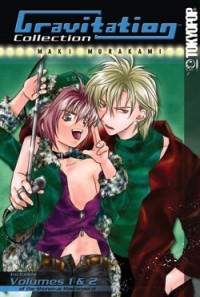
Collection: Vols. 1-2
(by Maki Murakami, Tokyopop, $14.99)
FROM THE BACK COVER:
"Shuichi Shindou is determined to be a rock star. Eiri Yuki is his most brutally honest critic. When their paths collide, the two find their futures inexorably intertwined... The force that brings them close together is like gravity—and there is nothing they can do to stop it!"
EVIDENCE FOR:
Eiri Yuki may not be Adam Lambert, but his confident and promiscuous personality is still a force of nature that fires up the opening chapters of Gravitation. Unlike other just-for-the-hell-of-it BL romances, the attraction between Shuichi and Eiri is a convincing one, with clear contrasts that make the relationship come alive. Shuichi's fascination with Eiri's intellect and bluntness is easily understood—after all, haven't we all met someone like that, whose personality is unconventional yet magnetic?—and the puppy-like emotional clinginess of Shuichi evokes empathy in its own way. And contrary to what the fandom might have you believe, there are also other characters in this series, creating new dimensions of jealousy, friendship and love. Nowhere is that more evident than with Shuichi's bandmate Hiroshi, who alternately supports him, mocks him, abandons him, rejoins him, and basically stands alongside Shuichi as they strive to make it as musicians. And that is perhaps the unsung virtue of Gravitation: it succeeds as a music manga as well, showing that the true industry is much more about hard work and focus than being an idol who gets discovered on the street.
EVIDENCE AGAINST:
You'd better hope that the personalities and relationships of the different characters are appealing enough, because if not for that, there would be nothing worth reading in here. The artwork is often sloppy and poorly managed—panels are kind of laid out wherever, backgrounds are an afterthought, and tones are thrown on simply to color in the white spaces. Let's not even get started on the character designs, which rely on the "Well, I hope my readers are smart enough to tell apart five different long-haired bishounen!" school of thought. The plot direction lacks craftsmanship as well, relying on a monotonic upward progression on both the music side and the romance side: Shuichi does a gig, gets popular, does another gig, gets more popular, and so on until the record label throws him a bone ... meanwhile, Shuichi gets naughty with Eiri, then gets more naughty with Eiri, then gets even more naughty ... see where we're going here? What do you do when you hit the climax? And why does the music side get more and more divorced from the romance side as the story progresses? It's like following two different series at once and both of them are heading nowhere.
FINAL VERDICT:
Despite the main characters' charismatic qualities, the poor plotting and worse art earn this series only a C+ in terms of overall execution.
YAKITATE!! JAPAN

Vol. 17
(by Takashi Hashiguchi, Viz Media, $9.99)
FROM THE BACK COVER:
"England. France. Germany. What common bond binds these three nations together? Answer: each is famous for producing unique, distinctive, delicious bread. But what of the island nation of Japan, home to rice and delicacies of the sea? Is there not a doughy, gastronomic delight they can claim as their own? The answer is no ... until now. Kazuma Azuma, a 16-year-old boy blessed with unworldly baking powers, has taking it upon himself to create Ja-pan, the national bread of the land of the rising sun.
In the third round of the competition, Azuma's team squares off against a couple of longtime enemies—disguised as ninja! Later, it is revealed that young baking genius Shigeru Kanmuri belongs to a famous yakuza family. Will he be forced out of the kitchen and into a life of organized crime?"
EVIDENCE FOR:
As the Pantasia 25 tournament progresses past the first few rounds, it's only to be expected that one might fear the danger of falling into repetition. So it's refreshing to see both new twists (Kanmuri is a yakuza heir?!) and new competition rules (they have to make jam?!) working their way into the story—and ensuring that our heroes' challenges continue to evolve with each round. At the same time, though, the best part of Yakitate!! Japan continues to be the things that are constant and familiar: Kawachi's impeccable timing with lame punchlines as he screams out "What do you mean?!" and recycles the "inochi" kanji pose, the sheer emotional intenstity of samurai baker Kai Suwabara, Azuma and Kanmuri's genius-level food expertise, and judge Kuroyanagi's always-bizarre taste test reactions. Of course, much of the humor wouldn't be possible without Takashi Hashiguchi's sure-handedness with a pen, drawing exaggerated visual gags and getting the most out of the characters. This unrestrained sense of humor, along with wink-and-nudge name puns and a bonus spoof chapter, guarantees instant entertainment at every point in the storyline.
EVIDENCE AGAINST:
Yakitate!! Japan may be holding up its usual standards when it comes to comedy, but the quality of the baking segments has clearly slipped. The conclusion of the ninja round is a real clunker, as Azuma's bread never actually gets tasted because the loser of the match is busy pulling out some deus ex machina. (It could be that the plot twist is supposed to be stupid for humorous effect, but that doesn't change the fact that it's still stupid.) But that's not the only place where the execution is poor: even before Azuma and company create their bread, there's many a dull scene where the guys are just sitting around planning what they're going to bake. Could it be that Hashiguchi, the master of audacious visual displays, has forgotten the importance of "Show, don't tell"? As a result of this mediocrity, the whole yazuka angle seems like a desperation move, while the arc has slowly devolved into trotting out paragraphs of food trivia and making bread out of it. Let's hope the next match gets more interesting.
FINAL VERDICT:
Who knew that even an award-winning action/comedy could run out of creative juice? A disappointing C+ for this effort, but let's hope it turns things around soon.

NIGHTSCHOOL
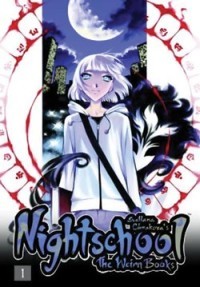
Vol. 1
(by Svetlana Chmakova, Yen Press, $10.99)
FROM THE BACK COVER:
"Schools may lock up for the night, but class is in session for an entirely diferent set of students. In the Nightschool, vampires, werewolves, and weirns (a particular breed of witches) learn the fundamentals of everything from calculus to spell casting. Alex is a young weirn whose education has always been handled through homeschooling, but circumstances seem to be drawing her closer to the Nightschool. Will Alex manage to weather the dark forces gathering?"
EVIDENCE FOR:
On the surface, Nightschool may look like so many fantasy-supernatural clichés jammed together—a magical school for magical-type people, vampires being vampires, and a dark conspiracy that threatens the fate of the world—but it is exactly these elements that shine thanks to Chmakova's imaginative approach. School activities are as much about teacher politics as student antics, and you can forget about classroom scenes, because what the grown-ups do in the staff room is far more interesting. Then there's the action-packed vampire-hunting scene, which amusingly takes the piss out of Twilight and then segues into a good old stake-in-the-heart brawl. As for the conspiracy that threatens the world—fantastical scenes of prophecy help to set the mood, and the first major plot twist arrives with such clever and subtle planning that the suspense lingers long after the scene is over. With flowing, effortless dialogue and equally flowing artwork, this is perfect proof of what words and pictures can achieve when tackling even the hoariest of ideas. Simply put, Svetlana Chmakova's brand of storytelling magic is a lot more potent than most other people's.
EVIDENCE AGAINST:
It is the question that many fans dread asking themselves: what if an artist they deeply admire is merely a one-hit wonder? (Natsuki Takaya: Yes. Peach-Pit: No.) After rocketing to fame with Dramacon, it seems like a step backward that Chmakova would dig into a genre that ranks slightly ahead of harem in terms of overuse. Not surprisingly, the usual transgressions are quick to pile up: too many characters and not enough time spent introducing them (yes, Svet, we know you are great at coming up with fresh character designs; please save some of them for later), a bad-guy plot that is only described in hushed tones and vague hand-waving, and of course, the idea that the fate of the world rides on a handful of teenagers and the attractive young adults supervising them. ("Seven children in a circle" ... really? What the?) Certain intimations of a dark dual personality, and a band of vampire hunters who are Just Too Cool For You, also appear to be pulled straight out of the action-fantasy-drama playbook. Seriously, if any amnesiacs or cross-dressers show up, it's all over.
FINAL VERDICT:
Oh Svet! Please don't be dragged into the black hole of genre dreck! A touch of humor and imagination keep this series interesting, but it's already walking a thin line.

Isn't it fascinating when artists who are renowned for a very specific genre or series do a full 180 and pull off something you would never expect? (I always thought of Moyoco Anno as an auteur of grown-up melodramas ... until she blew me away with the magical fantasy series of a lifetime.) In that vein, here's Terry Sunderland's opinion on Ohikkoshi.
P.S. Still looking for reviews on the Most Overrated Series. Come on, everyone's got one!
OHIKKOSHI
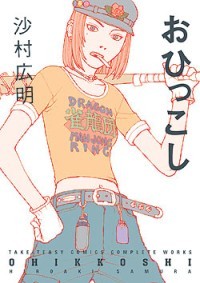
(by Hiroaki Samura, Dark Horse, $12.95)
Ohikkoshi is a one-off collection of stories from the man who's been bringing you Blade of the Immortal for all these years—but no edgy ronin are wisecracking their way across medieval Japan this time. Instead, you're dragged at high speed through sweaty downstairs clubs, raucous college bars and the aimless, painfully funny lives of a circle of friends in university. Honey and Clover it's not—in pacing and intensity, it's more like what happens when you accidentally drop a match into a paper bag full of fireworks.
In Ohikkoshi (which also includes the stand-alone story "Vagabond Shoujo Manga-ka") Samura uses the dramatic framing, dynamic layouts and brilliant drawing skills that make Blade of the Immortal so good, but with none of the slow, suspenseful pacing of a samurai story. Here everything's in fast-forward—throwaway gags, flashbacks, wild outbursts, hilarious diatribes—highlighting and mocking the self-seriousness of students in love and veering off on strange comic tangents.
Tono, our (virgin) protagonist, longs for Akagi, the sexy 'woman with moles' whose boyfriend is away in Zambia for a year. Tono's childhood friend Kobarukowa, the 'puny blonde' and Tono's friend Kido are in a seesaw relationship; who does Kobarukawa really like? Enter 'the Baron', a charismatic Italian on a farcical revenge mission to seduce and betray the women of Japan—all of them. Add heavy-metal references, mahjong obsessions, and the tragic story of 'Italian Seal of Approval' Instant Pasta, and we're still not even close to describing the range, the density, the weirdness or the appeal of Ohikkoshi.
Is there a hidden gem of manga you'd like to reveal to the world? Is there a piece of garbage that deserves to be bashed in public? Or is there a title that didn't get a fair grade here, and you want to set the record straight?
Now's YOUR chance to be the reviewer! Write a review of about 300-400 words (a little more or less is fine) and include:
- Your name
- Title of manga (and volume no., if applicable)
- Author/Artist
- Publisher
- Briefly describe the story, then explain why this manga is great, terrible, or in between. Be objective, but also be entertaining.
Then send it in to rtoreaders (at) gmail (dot) com. One review will be selected out of all the submissions and will be published in the next column. All types of manga and manga-inspired comickry are accepted, from past and present, from Japan and beyond—what matters is that it's the Reader's Choice! NOTE: Submissions may be edited for formatting and grammar.
discuss this in the forum (43 posts) |